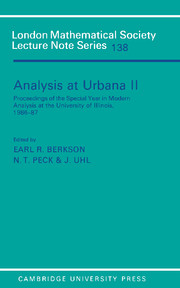Book contents
- Frontmatter
- Contents
- Acknowledgements
- PREFACE
- The C1contractions
- Factorization theorems for integrable functions
- Spectral decompositions and vector-valued transference
- Vector-valued Hardy spaces from operator theory
- Restricted invertibility of matrices and applications
- The commuting B.A.P. for Banach spaces
- The minimal normal extension of a function of a subnormal operator
- Two C*-algebra inequalities
- The generalised Bochner theorem in algebraic scattering systems
- Differential estimates and commutators in interpolation theory
- A survey of nest algebras
- Some notes on non-commutative analysis
- Some remarks on interpolation of families of quasi-Banach spaces
- An application of Edgar's ordering of Banach spaces
- Martingale proofs of a general integral representation theorem
Some remarks on interpolation of families of quasi-Banach spaces
Published online by Cambridge University Press: 05 September 2013
- Frontmatter
- Contents
- Acknowledgements
- PREFACE
- The C1contractions
- Factorization theorems for integrable functions
- Spectral decompositions and vector-valued transference
- Vector-valued Hardy spaces from operator theory
- Restricted invertibility of matrices and applications
- The commuting B.A.P. for Banach spaces
- The minimal normal extension of a function of a subnormal operator
- Two C*-algebra inequalities
- The generalised Bochner theorem in algebraic scattering systems
- Differential estimates and commutators in interpolation theory
- A survey of nest algebras
- Some notes on non-commutative analysis
- Some remarks on interpolation of families of quasi-Banach spaces
- An application of Edgar's ordering of Banach spaces
- Martingale proofs of a general integral representation theorem
Summary
Abstract. We study some questions raised in theory of complex interpolation of quasi-Banach spaces. In particular we give a criterion for the interpolated space to be locally convex.
1. Introduction. In [1] and [2], Coifman, Cwikel, Rochberg, Saghar and Weiss introduced and studied complex interpolation of families of Banach spaces. Recently, Tabacco [11],[12] and Rochberg [10] have studied the extension of these ideas to the non-locally convex quasi-Banach case.
We let T denote the unit circle in the complex plane and λ denote normalizecf Haar measure on T, i.e. dλ = (2π)−1dθ. Δ denotes the unit disk, {z : ∣z∣ < 1}. We then suppose that we are given a family of quasinormed spaces Xw for w ∊ T and define interpolation spaces Xz for z ∊ Δ. The precise details of the construction are given in Section 2.
In this paper we prove two main results on interpolation of analytic families of quasi-Banach spaces. In Theorem 4, we answer a question of Rochberg [10] by giving a condition for the interpolated space to be locally convex. We use here the notion of (Rademacher) type. A quasi-Banach space X is of type p where 0 < p ≤ 2 if there is a constant C so that if x1,…, xn ∊ X then
where the signs ∊k = ±1 are chosen at random. In fact if p < 1 then type p is equivalent to p-normability [5], but there are type one spaces which are not locally convex (e.g. the Lorentz spaces where 1 < p < ∞, or the Ribe space [5]).
- Type
- Chapter
- Information
- Analysis at Urbana , pp. 258 - 274Publisher: Cambridge University PressPrint publication year: 1989
- 1
- Cited by



